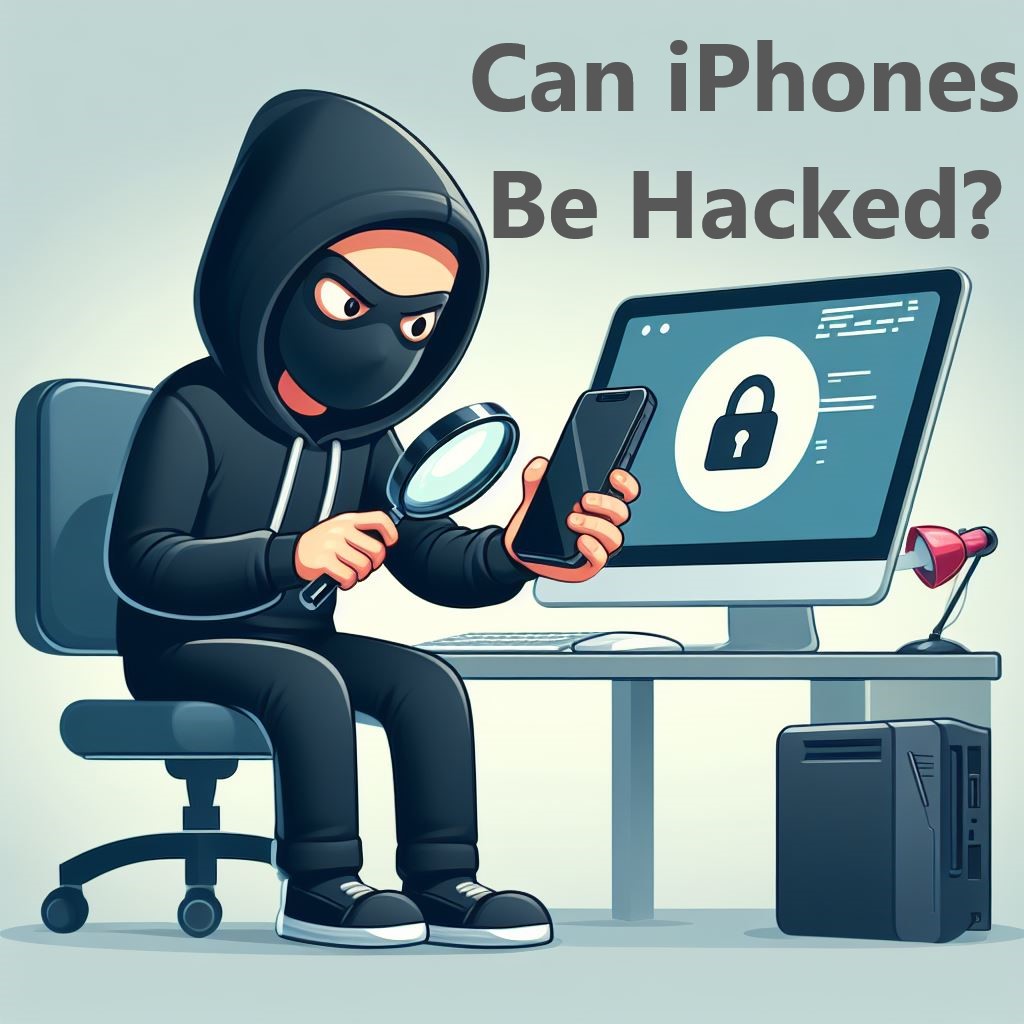iPhones are renowned for their strong security features and user-friendly design. However, the question on many users’ minds is, “Can iPhones be hacked?“
Yes, iPhones can be hacked. While generally more secure than some other operating systems, iPhones are not invincible. Hackers constantly develop new methods to exploit vulnerabilities in software and human behavior.
This article explores the different ways iPhones can be hacked. Provides tips on how to identify a compromised device, and outlines best practices to enhance your iPhone’s security.
How iPhones Can Be Hacked
Here’s a breakdown of the primary methods used to hack iPhones:
1. Phishing Attacks
Phishing attacks involve tricking users into providing sensitive information by posing as a trustworthy entity. For instance, a hacker might send an email that appears to be from Apple, prompting the user to enter their Apple ID and password. Once the hacker has this information, they can gain access to the user’s iPhone data.
2. Exploiting Software Vulnerabilities
Despite Apple’s rigorous security protocols, no system is entirely foolproof. Occasionally, hackers discover vulnerabilities in iOS that can be exploited. These vulnerabilities can sometimes allow hackers to install malware or gain unauthorized access to sensitive data.
3. Jailbreaking
Jailbreaking refers to removing the restrictions imposed by Apple on iOS devices. While jailbreaking can allow for more customization and functionality, it also opens the device up to potential security risks. Hackers can exploit the weaker security of jailbroken devices to install malicious software.
4. Physical Access
If a hacker gains physical access to your iPhone, they can potentially bypass security features. For example, they might use specialized software to extract data directly from the device. Therefore, it’s crucial to keep your iPhone in a secure location.
Signs of a Hacked iPhone:
While there’s no guaranteed sign, some potential red flags can indicate a compromised iPhone:
1. Unusual Battery Drain:
If your iPhone’s battery drains significantly faster than usual, it could be due to malware running in the background.
2. Unexpected Pop-Ups or App Crashes:
A sudden influx of pop-up ads or frequent app crashes might be signs of malware infection.
3. Unknown Apps:
If you find apps on your phone that you don’t remember installing, they could be malicious.
4. Decreased Performance:
A noticeable slowdown in your iPhone’s performance can be a sign of malware impacting system resources.
5. Data Loss or Unusual Activity:
Missing data or unexplained activity in your accounts (emails, social media, etc.) could indicate a hacker has accessed your information.
6. Overheating:
Continuous overheating may indicate that a malicious app is running intensively.
7. Increased Data Usage:
Unexplained spikes in data usage can also suggest that malware is transmitting data from your device.
Preventing iPhone Hacks: Best Practices
Here are some key steps you can take to minimize the risk of your iPhone being hacked:
1. Keep Your iPhone Updated:
Always install the latest iOS updates as soon as they become available. These updates may include security updates that address newly discovered vulnerabilities.
2. Avoid Jailbreaking
While jailbreaking might offer more customization, it compromises your device’s security. It’s best to avoid jailbreaking to keep your iPhone secure.
3. Download Apps from the App Store:
While convenient, avoid downloading apps from untrusted sources. The App Store’s review process offers a layer of security.
4. Be Wary of Phishing Attempts:
Avoid clicking on attachments or suspicious links in emails or text messages. Verify the legitimacy of senders before responding or clicking on anything.
5. Enable Strong Passcodes and Biometric Authentication:
Use a complex passcode or enable Face ID/Touch ID for added security. This makes it significantly harder for someone to gain unauthorized access to your phone.
6. Be Cautious with Free Wi-Fi:
For sensitive activities, avoid using public Wi-Fi networks for like online banking. For using public Wi-Fi, consider using a virtual private network (VPN) for an extra security.
7. Consider Security Software (Optional):
iPhones are usually pretty safe, but some security apps can give you extra protection from bad guys trying to steal your info or mess up your phone.
By following these best practices and staying alert, you can lower the risk of your iPhone being hacked. Remember, cybersecurity is continuous. Keep informed about new threats and take proactive steps to protect your device and personal information.
What to Do if Your iPhone is Hacked
- Change Passwords: Immediately change the passwords for your Apple ID and other important accounts.
- Restore from Backup: If you suspect your iPhone is hacked, restoring it from a backup can help remove malicious software.
- Contact Apple Support: For professional assistance, reach out to Apple Support.
- Check for Unfamiliar Apps: Remove any apps that you do not recognize or trust.
How to run a security check on my iPhone?
iPhones don’t have a security check app you can run yourself. But there are ways to make it much harder for your iPhone to get hacked. Keep your iPhone updated, use strong passwords, and only download apps from the App Store. Follow these simple steps.
To run a security check on your iPhone, follow these steps:
- Check for Software Updates: Go to Settings > General > Software Update to ensure your device is running the latest iOS version.
- Review App Permissions: Go to Settings > Privacy and review the permissions granted to each app.
- Use Built-in Security Features: Enable features like Face ID/Touch ID, and Find My iPhone.
- Install Security Apps: Consider using reputable security apps that can scan for malware and other threats.
How to check to see if your phone is hacked?
While there’s no definitive way to confirm a hack, you can be alert for the signs mentioned earlier. Such as unusual battery drain, unexpected pop-ups, or unknown apps. If you suspect your iPhone might be compromised, it’s best to err on the side of caution. Follow these steps:
- Change your Apple ID password and any other passwords stored on your iPhone.
- Remove any unknown apps you don’t recognize.
- Back up your data (if possible) and then reset your iPhone to factory settings. This will erase all data and settings, so be sure to back up anything important beforehand. Restoring from a backup created before the potential hack is not recommended as it might restore the malicious software as well.
Can an iPhone get hacked from a website?
Yes, iPhones can be hacked from a website, but it’s not as straightforward as clicking on a single link. Hackers typically use malicious websites in phishing attacks. These websites can be designed to look legitimate, such as mimicking your bank’s login page. Once you enter your credentials on the fake website, the hacker steals your information.
Here’s how to avoid being hacked through a website:
- Don’t click on suspicious links in Emails. Even if the message appears to be from a known sender, be cautious. If you’re unsure about a link, contact the sender directly to confirm its legitimacy.
- Pay attention to the website’s URL. Legitimate websites will have a URL that starts with “https://” and displays a padlock symbol in the address bar.
- Never enter personal information on an unfamiliar website. If you’re not sure a website is real, don’t give them anything important. This includes your passwords and credit card info.
By following these tips, you can significantly reduce the risk of being hacked through a website.
The more you know about how hackers try to steal information, the better you can protect your iPhone. Follow the security tips in this article to keep your data safe. Remember, always be careful online!

